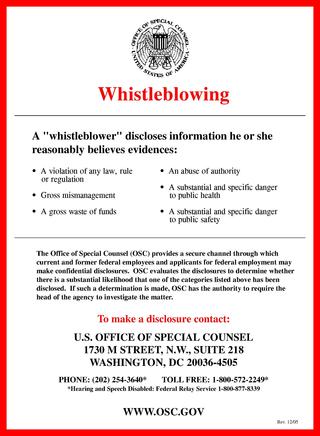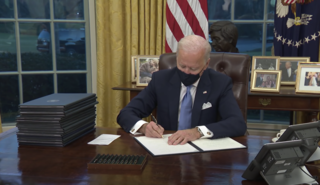
In the United States, an executive order is a directive by the president of the United States that manages operations of the federal government. The legal or constitutional basis for executive orders has multiple sources. Article Two of the United States Constitution gives presidents broad executive and enforcement authority to use their discretion to determine how to enforce the law or to otherwise manage the resources and staff of the federal government's executive branch. The ability to make such orders is also based on expressed or implied Acts of Congress that delegate to the president some degree of discretionary power. The vast majority of executive orders are proposed by federal agencies before being issued by the president.
Engineering ethics is the field of system of moral principles that apply to the practice of engineering. The field examines and sets the obligations by engineers to society, to their clients, and to the profession. As a scholarly discipline, it is closely related to subjects such as the philosophy of science, the philosophy of engineering, and the ethics of technology.
The United States federal civil service is the civilian workforce of the United States federal government's departments and agencies. The federal civil service was established in 1871. U.S. state and local government entities often have comparable civil service systems that are modeled on the national system to varying degrees.
Organizational ethics is the ethics of an organization, and it is how an organization responds to an internal or external stimulus. Organizational ethics is interdependent with the organizational culture. Although it is to both organizational behavior and industrial and organizational psychology as well as business ethics on the micro and macro levels, organizational ethics is neither organizational behavior nor industrial and organizational psychology, nor is it solely business ethics. Organizational ethics express the values of an organization to its employees and/or other entities irrespective of governmental and/or regulatory laws.

Douglas William Domenech is an American government official who served as the Assistant United States Secretary of the Interior for Insular Areas in the Trump administration from 2017 to 2021. He is a former George W. Bush administration political appointee who served in roles of Deputy Chief of Staff of the United States Department of the Interior, and Senior Advisor to the Secretary of the Interior, as well as having held a position on the White House Working Group on the Political Status of Puerto Rico.

A whistleblower is a person who exposes any kind of information or activity that is deemed illegal, unethical, or not correct within an organization that is either private or public. The Whistleblower Protection Act was made into federal law in the United States in 1989.

Executive Order 13770, entitled "Ethics Commitments by Executive Branch Appointees," was an executive order issued by US President Donald Trump on January 28, 2017, that directs executive branch employees on a ban from becoming a lobbyist for five years. The order, which reflected an increasingly standard practice of issuing such ethics rules by executive order early in a new administration, borrowed language from similar orders issued by past administrations.
The environmental policy of the Joe Biden administration includes a series of laws, regulations, and programs introduced by United States President Joe Biden from 2021 to 2025. Many of the actions taken by the Biden administration reversed or attempted to reverse the first-term policies of his predecessor, Donald Trump.

Executive Order 13985, officially titled Advancing Racial Equity and Support for Underserved Communities Through the Federal Government, was the first executive order signed by U.S. President Joe Biden on January 20, 2021. It directed the federal government to revise agency policies to account for racial inequities in their implementation. It was rescinded by Donald Trump within hours of his assuming office on January 20, 2025.
The social policy of the Joe Biden administration is intended to improve racial equity, increase access to safe and legal abortions, tighten restrictions on gun sales, among other aims. A number of policies aim to reverse the former policies of President Donald Trump, including the "Muslim" travel ban and loosened anti-discriminatory policies relating to LGBT people.
The Joe Biden administration pledged to pass government ethics reform. The Biden administration also pledged to pass legislation and enforce policies to enforce electoral reform, in response to the influence of special interests and gerrymandering in elections.

Executive Order 13988, officially titled Preventing and Combating Discrimination on the Basis of Gender Identity or Sexual Orientation, was the fourth executive order signed by U.S. President Joe Biden on January 20, 2021. It was rescinded by Donald Trump within hours of his assuming office on January 20, 2025.

Executive Order 13990, officially titled Protecting Public Health and the Environment and Restoring Science to Tackle the Climate Crisis is an executive order signed by President Joe Biden on January 20, 2021, which implements various environmental policies of his administration including revoking the permit for the Keystone XL Pipeline and temporarily prohibiting drilling in the arctic refuge. It was rescinded by Donald Trump within hours of his assuming office on January 20, 2025.
Executive Order 13995, officially titled Ensuring an Equitable Pandemic Response and Recovery, was signed on January 21, 2021, and was the eleventh executive order signed by U.S. President Joe Biden. The order works to guarantee a fair response and recovery from the COVID-19 pandemic. It was rescinded by Donald Trump within hours of his assuming office on January 20, 2025.
Executive Order 13996, officially titled Establishing the COVID-19 Pandemic Testing Board and Ensuring a Sustainable Public Health Workforce for COVID-19 and Other Biological Threats, was signed on January 21, 2021, and was the twelfth executive order signed by U.S. President Joe Biden. The order indicated that the United States should assemble the COVID-19 Pandemic Testing Board and guarantee a sustainable public health workforce to fight against the COVID-19 virus and other biological threats. The order was rescinded by Donald Trump within hours of his assuming office on January 20, 2025.
Executive Order 13992, officially titled Revocation of Certain Executive Orders Concerning Federal Regulation, was signed on January 20, 2021, and is the eighth executive order signed by U.S. President Joe Biden. The order works to withdraw certain federal regulation executive orders from the previous Trump administration. It was rescinded by Donald Trump within hours of his assuming office on January 20, 2025 following his re-election to his second, nonconsecutive term.
The Biden administration COVID-19 action plan, also called the Path out of the Pandemic, is a substantial increase in the use of vaccination mandates as part of the U.S. federal government response to the COVID-19 pandemic announced by President Joe Biden on September 9, 2021, to be carried out by officials in the Biden administration. The plan included various announced prospective efforts, as well as the issuance of several executive orders.
Executive Order 14148, entitled "Initial Rescissions of Harmful Executive Orders and Actions" is an executive order signed by United States president Donald Trump on January 20, 2025, during the first day of his second presidential term. The order directed the rescindment of several executive orders enacted during the Biden administration.
Executive Order 14183 titled "Prioritizing Military Excellence and Readiness" is an executive order issued by President Donald Trump on January 27, 2025. It revokes Executive Order 14004 and establishes policies to reinforce military standards related to physical and mental fitness, unit cohesion, and mission effectiveness.






